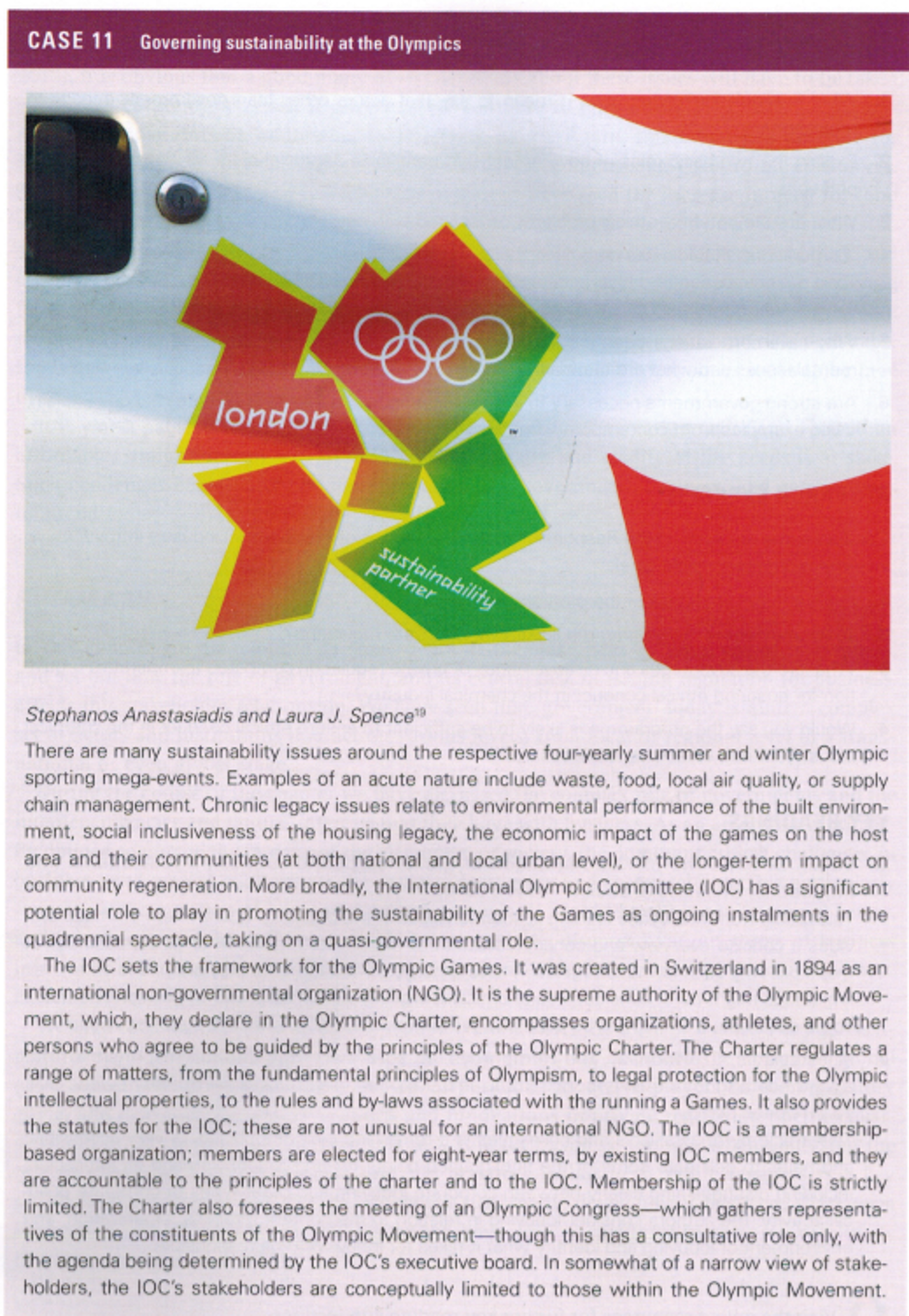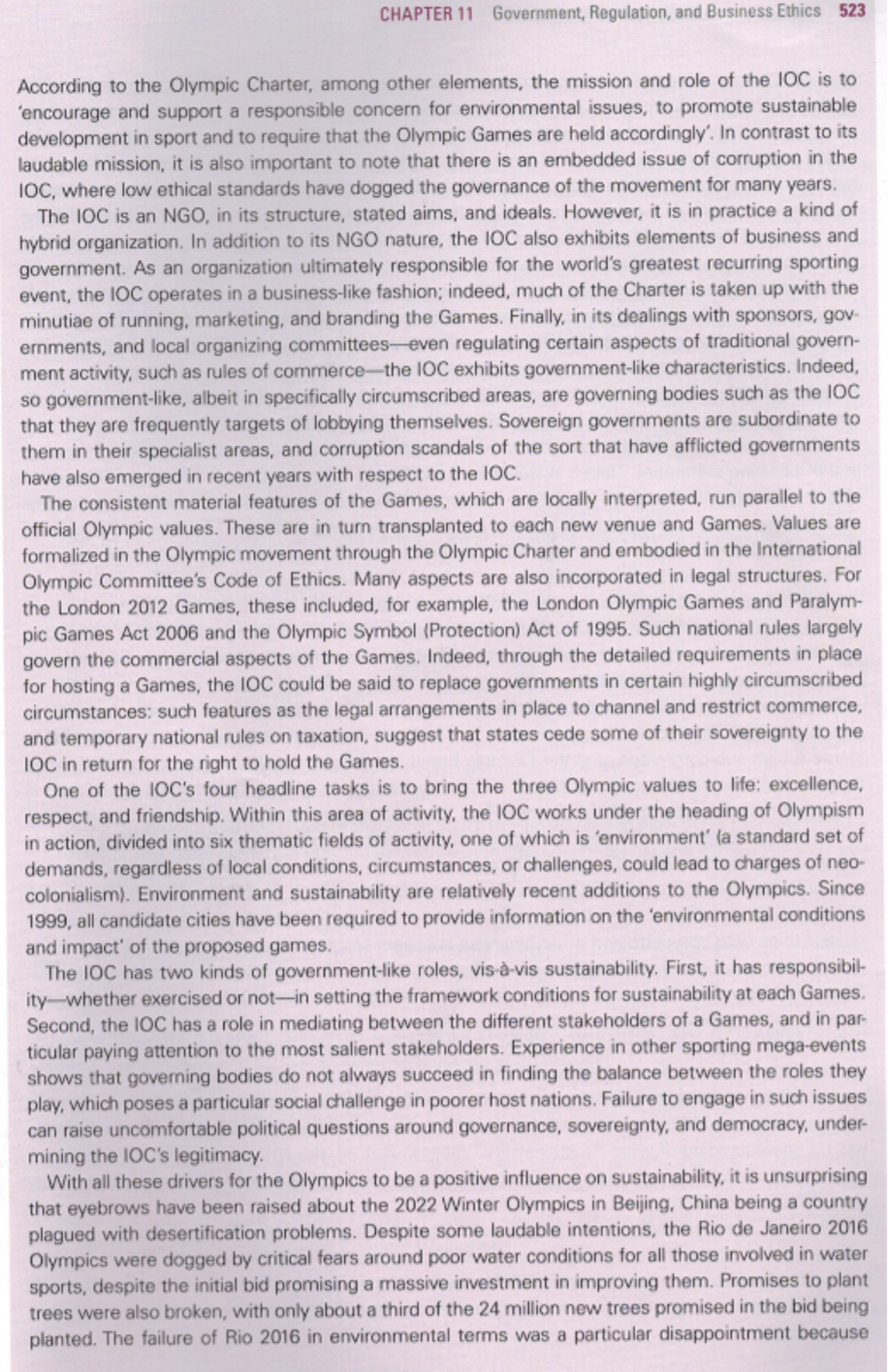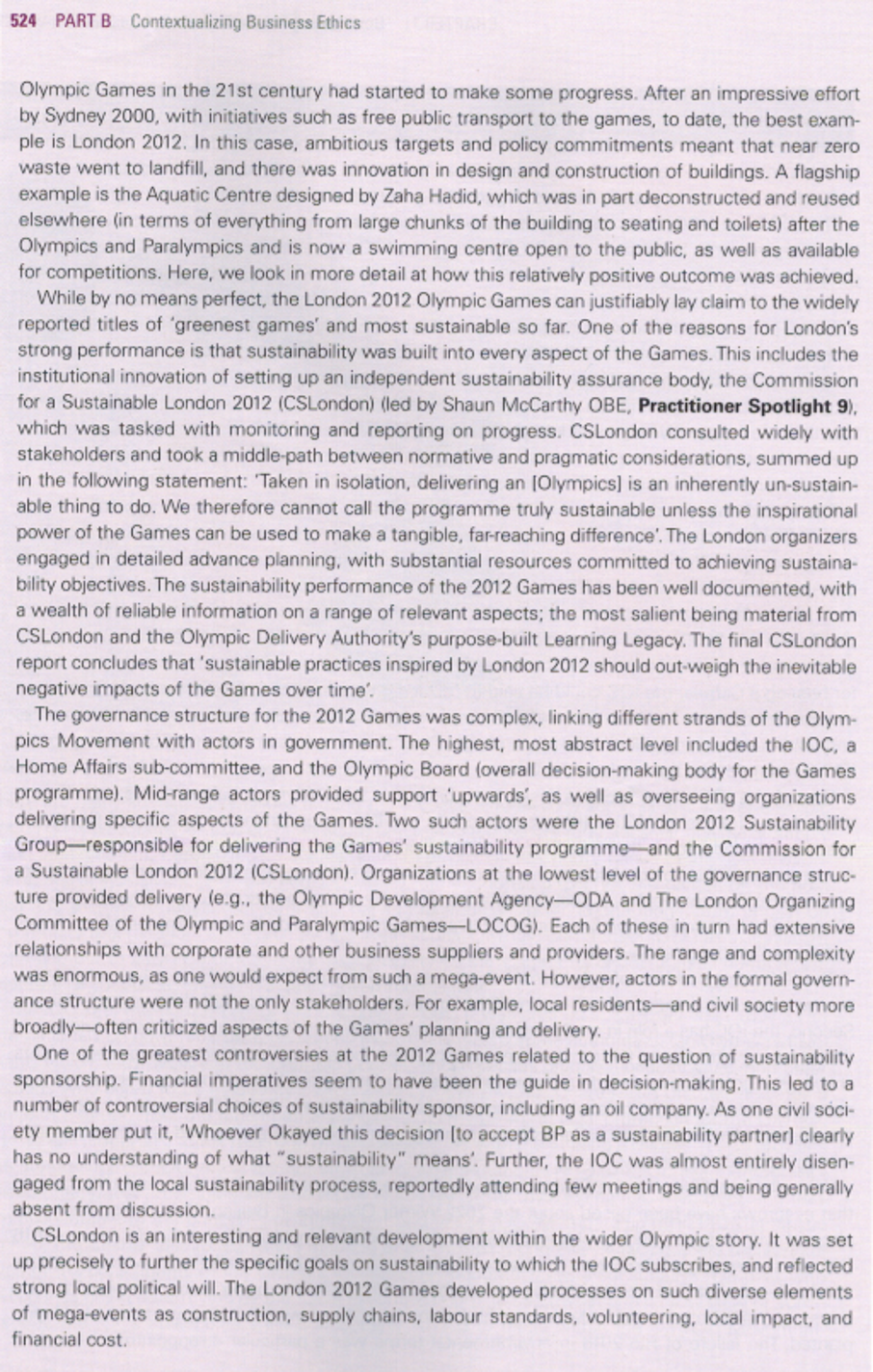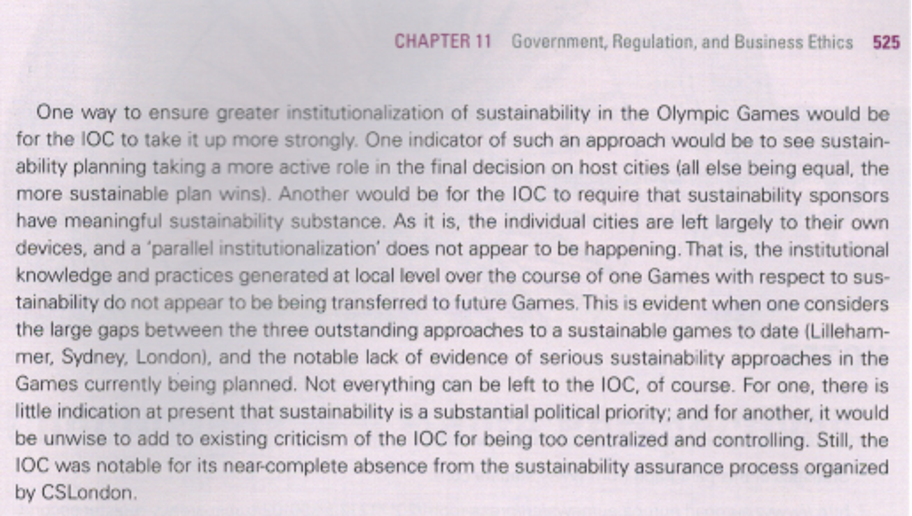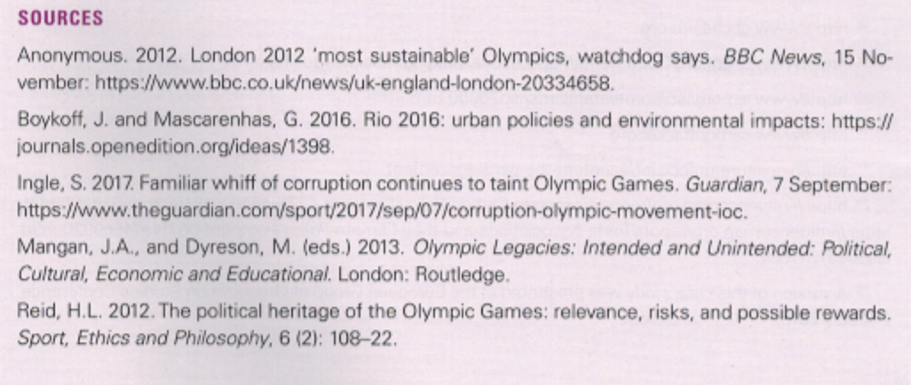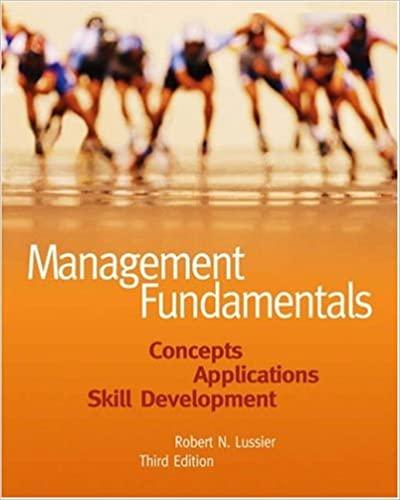CASE 11 Governing sustainability at the Olympics ases london sustainability partner Stephanos Anastasiadis and Laura J. Spence" There are many sustainability issues around the respective four-yearly summer and winter Olympic sporting mega-events. Examples of an acute nature include waste, food, local air quality, or supply chain management. Chronic legacy issues relate to environmental performance of the built environ- ment, social inclusiveness of the housing legacy, the economic impact of the games on the host area and their communities (at both national and local urban level), or the longer-term impact on community regeneration. More broadly, the International Olympic Committee (IOC) has a significant potential role to play in promoting the sustainability of the Games as ongoing instalments in the quadrennial spectacle, taking on a quasi-governmental role. The IOC sets the framework for the Olympic Games. It was created in Switzerland in 1894 as an international non-governmental organization (NGO). It is the supreme authority of the Olympic Move- ment, which, they declare in the Olympic Charter, encompasses organizations, athletes, and other persons who agree to be guided by the principles of the Olympic Charter. The Charter regulates a range of matters, from the fundamental principles of Olympism, to legal protection for the Olympic intellectual properties, to the rules and by-laws associated with the running a Games. It also provides the statutes for the IOC; these are not unusual for an international NGO. The IOC is a membership- based organization; members are elected for eight-year terms, by existing IOC members, and they are accountable to the principles of the charter and to the IOC. Membership of the IOC is strictly limited. The Charter also foresees the meeting of an Olympic Congress-which gathers representa- tives of the constituents of the Olympic Movement-though this has a consultative role only, with the agenda being determined by the IOC's executive board. In somewhat of a narrow view of stake- holders, the IOC's stakeholders are conceptually limited to those within the Olympic Movement.CHAPTER 11 Government, Regulation, and Business Ethics 523 According to the Olympic Charter, among other elements, the mission and role of the IOC is to 'encourage and support a responsible concern for environmental issues, to promote sustainable development in sport and to require that the Olympic Games are held accordingly'. In contrast to its laudable mission, it is also important to note that there is an embedded issue of corruption in the IOC, where low ethical standards have dogged the governance of the movement for many years. The IOC is an NGO, in its structure, stated aims, and ideals. However, it is in practice a kind of hybrid organization. In addition to its NGO nature, the IOC also exhibits elements of business and government. As an organization ultimately responsible for the world's greatest recurring sporting event, the IOC operates in a business-like fashion; indeed, much of the Charter is taken up with the minutiae of running, marketing, and branding the Games. Finally, in its dealings with sponsors, gov- emments, and local organizing committees-even regulating certain aspects of traditional govern- ment activity, such as rules of commerce-the IOC exhibits government-like characteristics. Indeed, so government-like, albeit in specifically circumscribed areas, are governing bodies such as the IOC that they are frequently targets of lobbying themselves. Sovereign governments are subordinate to them in their specialist areas, and corruption scandals of the sort that have afflicted governments have also emerged in recent years with respect to the IOC. The consistent material features of the Games, which are locally interpreted, run parallel to the official Olympic values. These are in turn transplanted to each new venue and Games. Values are formalized in the Olympic movement through the Olympic Charter and embodied in the International Olympic Committee's Code of Ethics. Many aspects are also incorporated in legal structures. For the London 2012 Games, these included, for example, the London Olympic Games and Paralym- pic Games Act 2006 and the Olympic Symbol (Protection) Act of 1995. Such national rules largely govern the commercial aspects of the Games. Indeed, through the detailed requirements in place for hosting a Games, the IOC could be said to replace governments in certain highly circumscribed circumstances: such features as the legal arrangements in place to channel and restrict commerce, and temporary national rules on taxation, suggest that states cede some of their sovereignty to the IOC in return for the right to hold the Games. One of the IOC's four headline tasks is to bring the three Olympic values to life: excellence, respect, and friendship. Within this area of activity, the IOC works under the heading of Olympism in action, divided into six thematic fields of activity, one of which is 'environment' (a standard set of demands, regardless of local conditions, circumstances, or challenges, could lead to charges of neo- colonialism). Environment and sustainability are relatively recent additions to the Olympics. Since 1999, all candidate cities have been required to provide information on the 'environmental conditions and impact' of the proposed games. The IOC has two kinds of government-like roles, vis-a-vis sustainability. First, it has responsibil ity-whether exercised or not-in setting the framework conditions for sustainability at each Games. Second, the IOC has a role in mediating between the different stakeholders of a Games, and in par- ticular paying attention to the most salient stakeholders. Experience in other sporting mega-events shows that governing bodies do not always succeed in finding the balance between the roles they play, which poses a particular social challenge in poorer host nations. Failure to engage in such issues can raise uncomfortable political questions around governance, sovereignty, and democracy, under- mining the IOC's legitimacy. With all these drivers for the Olympics to be a positive influence on sustainability, it is unsurprising that eyebrows have been raised about the 2022 Winter Olympics in Beijing, China being a country plagued with desertification problems. Despite some laudable intentions, the Rio de Janeiro 2016 Olympics were dogged by critical fears around poor water conditions for all those involved in water sports, despite the initial bid promising a massive investment in improving them. Promises to plant trees were also broken, with only about a third of the 24 million new trees promised in the bid being planted. The failure of Rio 2016 in environmental terms was a particular disappointment because524 PART B Contextualizing Business Ethics Olympic Games in the 21st century had started to make some progress. After an impressive effort by Sydney 2000, with initiatives such as free public transport to the games, to date, the best exam- ple is London 2012. In this case, ambitious targets and policy commitments meant that near zero waste went to landfill, and there was innovation in design and construction of buildings. A flagship example is the Aquatic Centre designed by Zaha Hadid, which was in part deconstructed and reused elsewhere (in terms of everything from large chunks of the building to seating and toilets) after the Olympics and Paralympics and is now a swimming centre open to the public, as well as available for competitions. Here, we look in more detail at how this relatively positive outcome was achieved. While by no means perfect, the London 2012 Olympic Games can justifiably lay claim to the widely reported titles of 'greenest games' and most sustainable so far. One of the reasons for London's strong performance is that sustainability was built into every aspect of the Games. This includes the institutional innovation of setting up an independent sustainability assurance body, the Commission for a Sustainable London 2012 (CSLondon) (led by Shaun Mccarthy OBE, Practitioner Spotlight 9), which was tasked with monitoring and reporting on progress. CSLondon consulted widely with stakeholders and took a middle-path between normative and pragmatic considerations, summed up in the following statement: 'Taken in isolation, delivering an [Olympics] is an inherently un-sustain- able thing to do. We therefore cannot call the programme truly sustainable unless the inspirational power of the Games can be used to make a tangible, far-reaching difference'. The London organizers engaged in detailed advance planning, with substantial resources committed to achieving sustaina- bility objectives. The sustainability performance of the 2012 Games has been well documented, with a wealth of reliable information on a range of relevant aspects; the most salient being material from CSLondon and the Olympic Delivery Authority's purpose-built Learning Legacy. The final CSLondon report concludes that 'sustainable practices inspired by London 2012 should out-weigh the inevitable negative impacts of the Games over time'. The governance structure for the 2012 Games was complex, linking different strands of the Olym pics Movement with actors in government. The highest, most abstract level included the IOC, a Home Affairs sub-committee, and the Olympic Board (overall decision-making body for the Games programme). Mid-range actors provided support 'upwards', as well as overseeing organizations delivering specific aspects of the Games. Two such actors were the London 2012 Sustainability Group-responsible for delivering the Games' sustainability programme-and the Commission for a Sustainable London 2012 (CSLondon). Organizations at the lowest level of the governance struct ture provided delivery (e.g., the Olympic Development Agency-ODA and The London Organizing Committee of the Olympic and Paralympic Games-LOCOG). Each of these in turn had extensive relationships with corporate and other business suppliers and providers. The range and complexity was enormous, as one would expect from such a mega-event. However, actors in the formal govern- ance structure were not the only stakeholders. For example, local residents-and civil society more broadly-often criticized aspects of the Games' planning and delivery. One of the greatest controversies at the 2012 Games related to the question of sustainability sponsorship. Financial imperatives seem to have been the guide in decision-making. This led to a number of controversial choices of sustainability sponsor, including an oil company. As one civil soci- ety member put it, 'Whoever Okayed this decision [to accept BP as a sustainability partner] clearly has no understanding of what "sustainability" means'. Further, the IOC was almost entirely disen- gaged from the local sustainability process, reportedly attending few meetings and being generally absent from discussion. CSLondon is an interesting and relevant development within the wider Olympic story. It was set up precisely to further the specific goals on sustainability to which the IOC subscribes, and reflected strong local political will. The London 2012 Games developed processes on such diverse elements of mega-events as construction, supply chains, labour standards, volunteering, local impact, and financial cost.CHAPTER 11 Government, Regulation, and Business Ethics 525 One way to ensure greater institutionalization of sustainability in the Olympic Games would be for the IOC to take it up more strongly. One indicator of such an approach would be to see sustain- ability planning taking a more active role in the final decision on host cities (all else being equal, the more sustainable plan wins). Another would be for the IOC to require that sustainability sponsors have meaningful sustainability substance. As it is, the individual cities are left largely to their own devices, and a 'parallel institutionalization' does not appear to be happening. That is, the institutional knowledge and practices generated at local level over the course of one Games with respect to sus- tainability do not appear to be being transferred to future Games. This is evident when one considers the large gaps between the three outstanding approaches to a sustainable games to date (Lilleham- mer, Sydney, London), and the notable lack of evidence of serious sustainability approaches in the Games currently being planned. Not everything can be left to the IOC, of course. For one, there is little indication at present that sustainability is a substantial political priority; and for another, it would be unwise to add to existing criticism of the IOC for being too centralized and controlling. Still, the IOC was notable for its near-complete absence from the sustainability assurance process organized by CSLondon.SOURCES Anonymous. 2012. London 2012 'most sustainable' Olympics, watchdog says. BBC News, 15 No- vember: https://www.bbc.co.ukews/uk-england-london-20334658. Boykoff, J. and Mascarenhas, G. 2016. Rio 2016: urban policies and environmental impacts: https:/ journals.openedition.org/ideas/1398. Ingle, S. 2017. Familiar whiff of corruption continues to taint Olympic Games. Guardian, 7 September: https://www.theguardian.com/sport/2017/sep/07/corruption-olympic-movement-ioc. Mangan, J.A., and Dyreson, M. (eds.) 2013. Olympic Legacies: Intended and Unintended: Political, Cultural, Economic and Educational. London: Routledge. Reid, H.L. 2012. The political heritage of the Olympic Games: relevance, risks, and possible rewards. Sport, Ethics and Philosophy, 6 (2): 108-22
